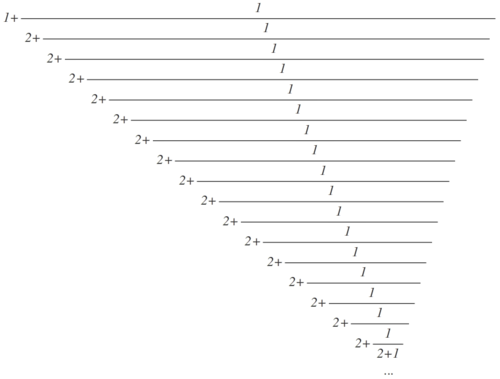Kabbalistic Fraction
 This fraction extends to infinity. What is the number it approaches?
This fraction extends to infinity. What is the number it approaches?
This section requires Javascript.
You are seeing this because something didn't load right. We suggest you, (a) try
refreshing the page, (b) enabling javascript if it is disabled on your browser and,
finally, (c)
loading the
non-javascript version of this page
. We're sorry about the hassle.
3 solutions
Nice answer!
interesting!
Mind blowing!!!!!!
i did the similar way.............great
interesting
Nice Solution :)
The answer is easy to find by looking the options carefully. Since this sum is like 1 + . . . . . . So it is greater than 1. So 2 1 and e i π . Further, this sum is obviously less than 2 because 1 upon a number greater than 1 is always less than 1. So e is wrong............... Hence 2 is the correct answer.
Much logic 0.o
This is way faster than how I did it.
y-1=1/(2+(y-1)) Game over.
First we evaluate x = 2 + 2 + 2 + 2 + 2 + 1 1 . . . 1 1 1
→ x = 2 + x 1
x 2 = 2 x + 1
x 2 − 2 x − 1 = 0
( x − 1 ) 2 − 2 = 0
( x − 1 − 2 ) ( x − 1 + 2 ) = 0
x = 1 + 2 , 1 − 2
As 1 < 2 , this implies that the second root is negative and thus is not a solution.
Therefore x = 1 + 2
The question is asking for x − 1 , which is equal to 1 + 2 − 1 = 2